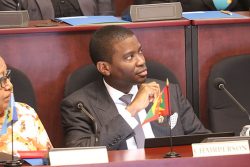DAKAR (Reuters) – Senegal President Abdoulaye Wade, who is seeking to extend his 12-year rule in the West African state despite complaints he is violating term limits, was heckled by scores of voters as he cast his ballot yesterday.
The election follows weeks of violent street protests against the 85-year-old’s bid for a third term, and a stream of warnings Senegal’s reputation as an established democracy now hangs in the balance.
More than 100 people booed and chanted “Wade go away” in the local Wolof language as the visibly annoyed leader, seen as favourite against a fractured opposition, was ushered out of the polling station by his aides without giving a speech.
Despite facing heavy opposition to his candidacy among Senegal‘s urban youth, Wade claims strong support particularly in rural areas, and has said he is confident of a win in the election’s first round of voting.
Foreign powers and diplomats had issued appeals for a calm and transparent vote, and a top African mediator failed to secure an agreement between Wade and his rivals over a shortened term for the incumbent if he won.
“We are closely watching the development of the situation. I have been concerned about what is happening there,” UN Secretary General Ban Ki-moon told journalists when asked about Senegal during a visit to Zambia on Saturday.
Apart from some polling stations opening late, voting appeared to be unfolding smoothly, according to a national network of observers. Polls were meant to open at 0800 GMT started closing at 1800 GMT.
“We are seeing a good turnout … There have been practically no incidents, things are calm,” said Abdou El Mazide Ndiaye, who is heading an election “situation room” set up by the RESOCIT network of national observers.
In the working class neighbourhood of Parcelles Assainies, hundreds of voters, many in their best clothes and some fingering prayer beads, lined up patiently to cast their ballots.
“You can see the determination of the people, they want change,” said Awa Faye Ndoye, a housewife, after she voted. She predicted people would take to the streets in protest if Wade was declared winner.
Senegal is the only country in mainland West Africa that has not suffered a coup since independence and previous elections have gone mostly smoothly, a record the former French colony has worn as a badge of democratic distinction.But the run-up to yesterday’s poll has been tense, with Wade’s rivals saying he should not be allowed to stand due to term limits but the incumbent saying restrictions were brought in after he took power, so his first term should not count.
Senegal’s top legal body in late January approved Wade’s candidacy, triggering a wave of clashes between rock-throwing protesters and police firing teargas and rubber bullets in which at least six people have been killed.
Senegal music star Youssou N’Dour, a vocal critic of Wade who’s own bid to run in the election was turned down on technical grounds, said he feared a fraudulent outcome.
“We will not accept an electoral coup here – the Senegalese are not stupid … The rest of the world is watching what goes on in Senegal very closely,” he told reporters at a polling booth in the middle class Dakar district of Amitie.
Counting was due to start last night. If no candidate wins an outright majority, there will be a run-off election.
Washington has said Wade’s decision to run again was regrettable, while Paris has said it was time for Senegal’s younger generation to take power.
But Wade, a veteran of years in opposition before he took power in 2000, has mocked rivals at home for failing to mobilise a significant challenge and batted critics from abroad.
“This is Africa. Yes, I am old but I am physically well,” Wade told French weekly Sunday newspaper Le Journal du Dimanche. “My age has become an advantage. I am president and father of the nation. This is what the Europeans do not understand.”
Wade has touted infrastructure projects including new roads and an airport as major achievements. But he has been criticised for not doing enough to improve the lives of ordinary Senegalese, particularly in the capital.
“You can’t deny that he’s done certain things like the roads, but you can’t eat infrastructure,” said Beyda Fall, a 50-year-old who works for an Internet technology company.





